#(obviously do not do this for real)
Text
probably time for this story i guess but when i was a kid there was a summer that my brother was really into making smoothies and milkshakes. part of this was that we didn't have AC and couldn't afford to run fans all day so it was kind of important to get good at making Cool Down Concoctions.
we also had a patch of mint, and he had two impressionable little sisters who had the attitude of "fuck it, might as well."
at one point, for fun, this 16 year old boy with a dream in his eye and scientific fervor in heart just wanted to see how far one could push the idea of "vanilla mint smoothie". how much vanilla extract and how much mint can go into a blender before it truly is inedible.
the answer is 3 cups of vanilla extract, 1/2 cup milk alternative, and about 50 sprigs (not leaves, whole spring) of mint. add ice and the courage of a child. idk, it was summer and we were bored.
the word i would use to describe the feeling of drinking it would maybe be "violent" or perhaps, like. "triangular." my nose felt pristine. inhaling following the first sip was like trying to sculpt a new face. i was ensconced in a mesh of horror. it was something beyond taste. for years after, i assumed those commercials that said "this is how it feels to chew five gum" were referencing the exact experience of this singular viscous smoothie.
what's worse is that we knew our mother would hate that we wasted so much vanilla extract. so we had to make it worth it. we had to actually finish the drink. it wasn't "wasting" it if we actually drank it, right? we huddled around outside in the blistering sun, gagging and passing around a single green potion, shivering with disgust. each sip was transcendent, but in a sort of non-euclidean way. i think this is where i lost my binary gender. it eroded certain parts of me in an acidic gut ecology collapse.
here's the thing about love and trust: the next day my brother made a different shake, and i drank it without complaint. it's been like 15 years. he's now a genuinely skilled cook. sometimes one of the three of us will fuck up in the kitchen or find something horrible or make a terrible smoothie mistake and then we pass it to each other, single potion bottle, and we say try it it's delicious. it always smells disgusting. and then, cerimonious, we drink it together. because that's what family does.
#this is true#writeblr#warm up#relatedly for some reason one of our Favorite Jokes#amongst the Siblings#is like - ''this is so good u will love it''#while we are reacting to something we OBVIOUSLY find viscerally disgusting#like we will be actively retching and be like ''nooooo it's so good''#to the point that i sometimes get nervous if someone outside my family is like oh u should try it its good#(obvi we never force each other to eat anything. we are all just curious birds and#like. we're GONNA try the new thing.)#edit to answer why we had so much vanilla:#my mom is a very good cook and we LOVE to bake. so she just had a lot of staples in the house.#it's one of those things that's like. have u ever continuously thought ''ah i should get butter im probably out''#even tho u are not out of butter. so u end up with like 5 years of butter.#my mom would do that in a costco but like with vanilla extract#to be fair we WERE always using WAY TOO MUCH bc we were kids#so like she was right to stock up#ps. yes we were VERY sick after this lol i just didn't want to include it in the post in case ppl had an ick about that#u can tell it's real bc we knew "oh no we fucked up that's too much vanilla to waste'' but our reaction was to just. keep drinking it#> sibling understanding that vanilla extract isn't free > knowledge mother doesnt mind if we use it for milkshakes#> sibling choice to maybe get in a loophole of ''not wasting it'' if we drink it bc that's the same as using it (not throwing it out)#listen bud i was like 13 and my sister was like 9#when my mom discovered this we. got in. A LOT. of trouble. a lot of it. a LOT of it.#3rd edit bc i guess it isn't clear - i am 1 of my brother's 2 little sisters#i am the middle child#out of all the ways i have had to explain a post before being like ''did u forget a middle child can happen'' is my favorite
52K notes
·
View notes
Text
i swear sometimes i think people forget that Jon's s1 skeptic act was just that—an act. it was an act!!! he believes the statements!! he's believed them since episode one! do we so soon forget that he denied the statements were real because he knew the Eye something wanted him to be scared, and he knew that was bad, so he decided to act like the statements just didn't scare him? remember, he was working with extremely limited information ("when i record the tape statements, i feel watched, like something knows i'm afraid, and i don't want it to know that"), and came up with a genuinely solid solution with what he had! not his fault that the thing watching him was a literal unknowable eldritch entity that feeds on fear, and he was just some underqualified archivist.
#sorry. saw a post and got a little angry about it#like bro! he literally tells martin in a fan-favorite conversation that it! was! an! act!#we KNOW he's believed in the supernatural since age eight!#i'm so tired of the ''lol haha jon didn't believe the OBVIOUSLY real statements but they still spooked him'' posts#i will not take this blorbo slander#leave my guy alone he tried his best. and was scared out of his mind while doing it#the magnus archives#jonathan sims#friday chats#it's like 1:30 am if this is moderately incoherent don't come at me
2K notes
·
View notes
Text
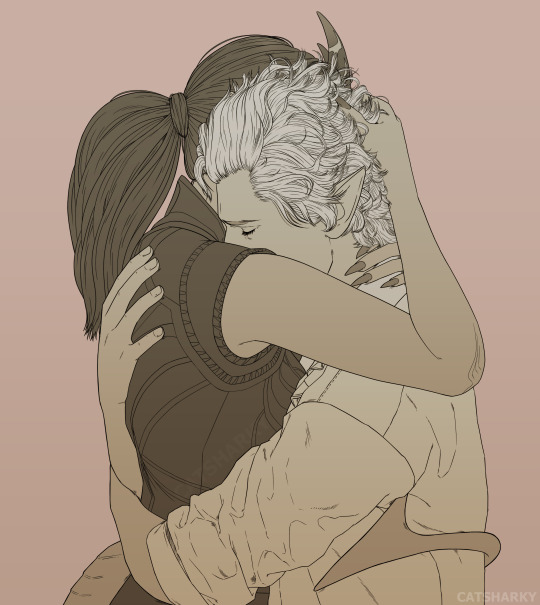
I'm sobbing and clawing at the screen begging Larian to just let my Tav give more hugs because so many of these characters need it.
WIP cause this is getting colours, I just like how the lines look
#bg3#baldur's gate 3#astarion#bg3 astarion#my tav#sharky's tav#she's a tiefling bard#also surprise! I'm not dead#Baldur's Gate just has me by the throat and it's not letting me tap out until I see the end credits#there's a new tattoo on my brain next to the Mass Effect one#I'm hopefully gonna do a 'BG3 characters get the hugs they deserve' series#Astarion was obviously first because. yeah.#Rolan's likely next cause I'm fucking gone on him too love him would kill and die for him would rip the heavens and hells apart for him#If Astarion hadn't swooped in and snatched my heart first I'd be real pissed that Rolan wasn't romanceable because hhhhhh#sharky art#tav: ember#oc: ember
1K notes
·
View notes
Text













Brian David Gilbert on Sad Boyz
feels fandom relevant.
[ID: A series of screen captures of Brian David Gilbert speaking on a podcast: "The thing that you invest your time in can feel so important to your identity that occasionally you feel, like, you need to close it off from other people in order to keep it safe. And I think that's where a lot of nerd culture, all that gatekeeping stuff, all of the toxicity stems from that thing where it's like, "In high school I didn't have a lot of friends or connect with a lot of people, but I did have this comic book, and now this comic book is super popular, but these people don't like me. That must be because they're not real fans."" End ID]
#feels very appropriate recently#oh you didn't read those comics? or these ones? or any? you're not doing it right#oh you're not including my favorite character? you're not doing it right#your fic/headcanons/meta annoys me? you're not doing it right#like come on these comics are 80 years old#obviously fanon vs canon is a battle that exists in almost every fandom but it's been esp prevalent in this fandom i've noticed#let's be real guys the comics are sometimes really bad and sometimes fanon is really good#anyway i watched this and it felt applicable#so that's my two cents#gatekeeping#fandom#etc
1K notes
·
View notes
Text
"new friend?"
Another day in neighborhood, another troublemaker in Howdy's bugdega

Explaining that he has a whole stack, stash and a box of things to do, "uncle Howdy" tells Lilly to go find someone else to play with, giving a couple of beloved by her tangerines, to sweeten the situation at least a bit.
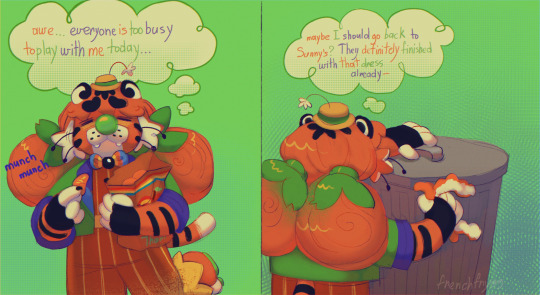
Throwing out the peels Lilly finds something bizarre- more like someone??
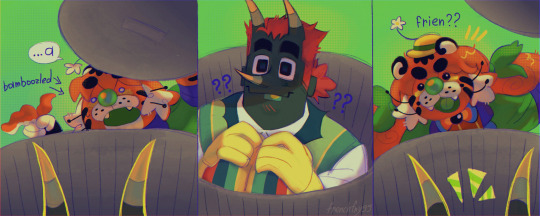
They went to visit frogs later :]

That frog ribbited something too personal 😔😔

Tiger cubs tend to bite others while playing, so does Lilly! (Nobody can escape the lil ankle biter!! Muhaha!!)
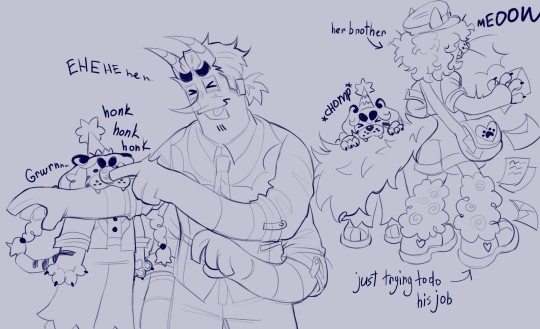
Her clown nose honks if you press on it! :]
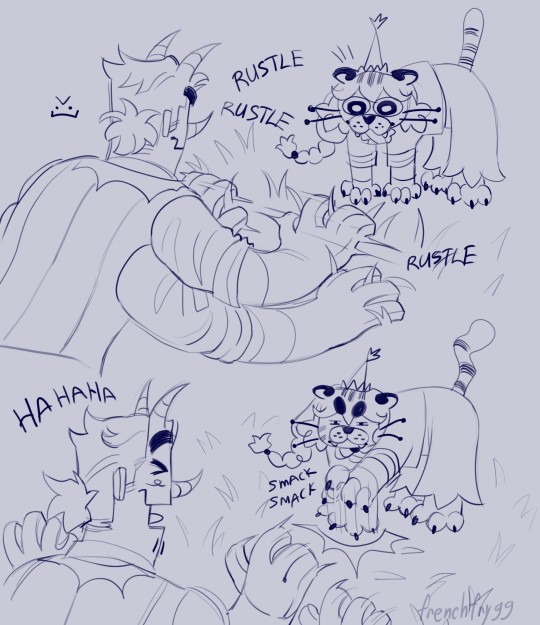
so silly!!!! Gahhhh!!!! He better watch out for the claws though-
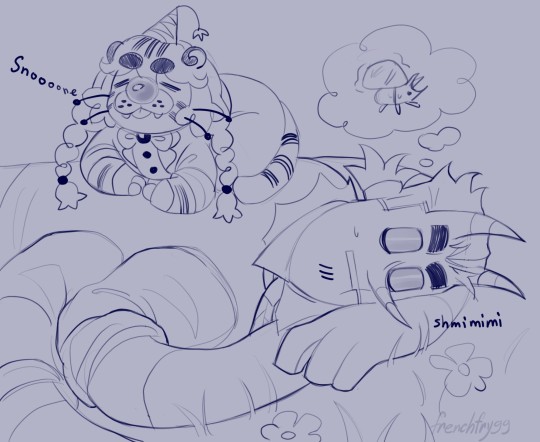
Being silly whole day is a hard job to do so they're taking a nap😔😔
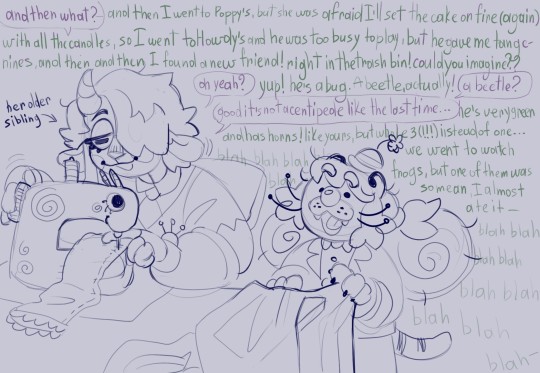
Goofy doodle of "the mandatory older sibling report in the end of the day" lmao (Sunny would think Robbie is just one of the countless itty bitty bugs Lilly befriends)
Robbie belongs to @clownsuu ! >:^]
#they'd play roblox together 😔😔#Lilly finds another green uncle real not clickbait#those two live rent free in my brain so I just HAD to make them interact HUEHSHGH#welcome home#welcome home puppet show#welcome home fanart#welcome home oc#the silly siblings wh#lilly silly wh#welcome home howdy#howdy pillar#robbie robs#actually there's a reason behind Lilly seeing all bugs as friends#and why she longs for constant company#like obviously cuz she's a child and all that#but the other reason she doesn't realize or can't remember#and probably won't ever will#gotta befriend who you can when you live in the woods for long right??#anyways EXPLODES THEM W MY MIND /affectionately#wanted to do more doodles but I'm too burned out guhhhh
2K notes
·
View notes
Text
The only way I can rationalise people accepting literal children going out and fighting crime as Robin is if they don't think Robin is a real child.
I think it would be fun to see how Bruce would use that to his advantage in protecting his kids. Like, if people think Robin isn't human, if they instead think he's a spirit or a ghost, they are less likely to shoot at him, less likely to try and physically attack Robin because they think it would be no use.
The fun part would be deciding HOW they would do this. I like to think that Robin's domino mask doesn't have a hole for his eyes but instead is glazed over so that he can see out of it, but you can't see in. Maybe they install small lights in it so it looks like his eyes glow in the dark, because can you image how fucking scary it would be to just see these two sentient light-like eyes and just know the Batman must be lurking somewhere close by?
Maybe Bruce installs super strong magnets in their gloves because on the chance that someone does pull a gun on his kid close range, it would be a lot easier for them to grab the gun away if they had the force of magnetism on their side. Also, grabbing onto poles and other metal materials would make all the scaling on tall buildings a little safer. Obviously, they'd need a way to turn it on and off, but still. Can you imagine, you're in a warehouse and there are steel frames fucking everywhere and you look up and suddenly there's a child gripping onto one effortlessly? Horrifying.
Maybe they have a voice box. Want to scare people? Play this really ominous recording of a child's laughter that echoes just a bit too loud to be normal. Play this ominous screaming that seems too silent to be real. Play this ticking that seems to never end that induces stress and increases the chance of them messing up.
What would be even funnier is keeping this act up with the Justice League and other teams.
Batman doesn't bring Robin to these meetings at the beginning because he sees no need to involve a preteen in such matters, but at some point the subject does come up and it's sort of like; So, Bats, what exactly is the kid? Like...is he yours?
And Bruce (paranoid as fuck) doesn't want to admit to these people that yes, Robin is my son because hello? That's gotta be his biggest weakness, he would do anything to keep that kid safe and fuck them if they ever tried to hurt him to get to Bruce.
So, he tells them that he's a spirit sent to haunt him and remind the city of it'd failures and the Justice League just... believe him?? Because this is Batman, and why would Batman ever lie about something so, frankly, strange? And it's not a huge deal, like they're a team comprised of metas and aliens and literal godesses, so what if the one normal human guy has a weird little ghost child? Who cares if he cares about it like it's a real boy? Maybe the baby spirit has rights, too!! They don't know!
So, when the JLA gets more popular and becomes an actual, legal part of the American government, they're required to list all of their members. And they class Batman as a human, because that's obvious but next to Robin, they don't really know what to say or how to ask Batman about it, ao they just put "Unknown Child Spirit - TBD"
And then just... never change it?
So, they don't question why a few years later Robin seems to look entirely different, or why after that he changes again, or why Robin is suddenly a girl for a while before going back to a little boy. That's obviously just some weird spirit thing they don't understand, and it's not like Batman is going to explain it!
#batman#batman and robin#robin#justice league#bruce wayne#dick grayson#jason todd#tim drake#stephanie brown#damian wayne#the kids obviously play into this as well making themselves seem not fully human#but also??#they arent exactly normal anyway so it really doesn't matter#dick joins a team for the 1st time as robin and everyone else is kind of like#“so...do you eat? are you...wanna play video games??”#and dick#who has been raised in a circus before joining a family comprised of batman and alfred has not really played any video games#and obviously there is no way a real human child has not played video games before so everyone never even thinks that MAYBE its not true#shit talker talks
447 notes
·
View notes
Text
“When toxic behavior is portrayed as romantic, it’s problematic. When problematic behavior is portrayed as a character flaw for a character to work through, it’s good storytelling.”
Katsuki Bakugou, my friends.
His behavior was problematic but never once portrayed as romantic at the same time. Katsuki said and did awful abusive things, and he also chose to be better when he was given the chance. If you’re still hung up on chapter 1 Katsuki now then I don’t think you’ve been reading the same story I have.
I can’t speak for everyone, but I’m not shipping Izuku with an irredeemable abuser. I’m shipping him with his most important person. His narrative foil. His childhood friend who made awful mistakes and then made it right when he saw he was wrong. The person Izuku looks up to and strives to emulate, despite their past struggles.
Bakudeku is so good because of how flawed these boys are, and how hard they’ve worked to get over it, and how much they matter to each other after it all
#perfect stories about perfect people who never do anything wrong are usually boring#stories about growth and mistakes and redemption and forgiveness and progress are lit#bkdk#bakudeku#the quote is from cinema therapy on YouTube btw#love them so much#they look at media and talk about what is and isn’t good from a real life human perspective#and boy did this quote slap me in the face#anyway this is my thought literally any time anyone says something about shipping Izuku with his abuser#if he was still being abused then I get it#but he’s not#and saying he needs protection from Katsuki is honestly doing his character dirty#and this is not to say that every situation with an abuser and a victim should turn out romantic#obviously not#the world is not black and white and neither are people#sometimes you have to get yourself out and never look back and that is valid and healthy#but sometimes you’re talking about two boys in a manga who literally cannot stop thinking about how good and incredible the other is#bro I get it#surface level chapter/episode 1 Katsuki is literally the worst#but his glow up has been literally meteoric
411 notes
·
View notes
Text
fat people! this is your sign to dress sluttier. you dont have to dress modestly just bc youre fat. fat looks so fucking good in shorts and crop tops you guys
#ok to rb#summer time is the best time to dress real slutty#obviously this is only if you want to dress slutty. do what makes you comfortable#hof
1K notes
·
View notes
Text
CLASSES - a comprehensive guide
The first thing that needs to be said is that there is no such thing as a "bad" class. All of them have the potential to be a great detriment OR great boon to the rest of the team, depending on how far along the journey of self-actualization a party member is. Some may have steeper challenges, but this corresponds with greater rewards.
The second thing that needs to be said is that all players are part of a team, and all personal journeys and playstyles are interlinked. No class is truly "solo." Even the smallest viable session is still two people, and even the most suitable classes for solo play are stronger when they're in a party.
The last thing that needs to be said is that the game wants you to succeed. The game, inherently, wants every player to reach godhood, wants every player to self-actualize, wants every player to win. It respects free will and free choice, so it will allow for failures (and, indeed, doomed timelines are vital to the alpha one existing), but Skaia is ultimately optimistic, and tries at every turn to ensure that a golden ending is possible.
Because, after all, SBURB/SGRUB - and Homestuck itself - are about children growing up, maturing, and learning compassion for each other. About fixing their flaws and rejecting the negative aspects of the society they came from. It's about how it is our duty, our responsibility, to become kind, mature people who care about one another, because we will one day be responsible for creating a new society.
And so, without further ado:
ACTIVE (-) Classes and PASSIVE (+) Classes are described with the dichotomy of "powers working for the self" vs. "powers working for others," but I believe this to be an oversimplification of what the active and passive split is. Both active AND passive classes benefit from being in a party; however, an active class will gain fewer party benefits in exchange for being more suited for solo play, while a passive class will be less suited for solo play, but confer much greater benefits to party play.
This is reflected in their personal quests: while active classes and passive classes will both require intervention, empathy, and guidance from their teammates, the struggle of an active class is usually one of grappling with internal flaws, and the struggle of a passive class is one of grappling with interpersonal or societal relations. In other words, the personal quest of an active player will usually involve getting therapized, while the personal quest of a passive player will usually involve addressing a systemic societal issue. Often, both will be required, but whether a class is active or passive will indicate an area of focus.
KNIGHT - / MAID +
PARTY MANAGEMENT
one who wields [aspect] or leads with [aspect] / one who distributes [aspect] or manages with [aspect]
KNIGHTS (-) are a very flexible and versatile class; "wielding" their aspect does not necessarily mean they are skilled at DPS. It actually indicates the way a knight interacts with their aspect, a very straightforward relationship of tradesperson and tool, or soldier and weapon. Similarly, while a knight does not always take up the "leader" position in the party, they will be the "spearhead," a point behind which the other players rally, a beating heart keeping the party together.
This straightforward relationship between a knight and their aspect leads to knights finding little difficulty mastering their aspect once they've begun. Many knights are, in fact, instinctively drawn toward utilizing their aspect, in the same way that they are naturally drawn toward roles of importance or heroism.
Knights often struggle with their perceived place in society, as well as with their innate sense of self and self-worth, seeing themselves as outcasts, resenting the responsibility placed on their shoulders, and fearing vulnerability. Unaddressed, these issues will lead to knights who actively become a detriment to party success. For example, they can dismiss valid concerns, shirk their duties, and in the worst case scenario, actively lead the party down the wrong path, invoking their natural ability to lead for ill.
Therefore, a knight's journey is one of accepting themselves and accepting their duty to better the world. It is about coming to terms with their own insecurities and learning to rely on others. It is about learning to take responsibility, and accepting the banner of a just and glorious cause.
A fully realized knight will be the center of every charge, the guiding star behind which the other players rally. They can provide clarity and guidance to those still on their journeys, and peace and comfort to those who are struggling or in pain. Where the knight goes, the party will follow, as a unified and united front.
MAIDS (+), meanwhile, tend to be on the backlines. If the knight is the forward march, then the maid is the supply line, an incredibly vital role whose absence is disastrous, even if its presence is nearly invisible. Maids have a nearly infinite well of their aspect to distribute, and are uniquely talented at managerial duties - keeping players on task, patching up the holes in a plan, sourcing and supplying resources, so on and so forth.
This is not to say that maids are relegated to support roles - a maid is usually capable of holding their own in combat just fine, especially if they've been endowed with a more combat-suited aspect. Both knights and maids are extremely versatile. That being said, maids truly shine when they're able to take on these backline roles, and many maids are more noticeable by the devastating effects of their absence rather than the invisible touch of their presence.
However, they are the class that most often starts in subservient conditions - low status, strict duties enforced upon them, so on - and their personal journey is a constant struggle against the control of others. Maids whose parties fail to grapple with and undo these shackling forces will find their maids succumbing to the influence or control of malicious entities; in the worst-case scenario, a maid can become an actively hostile enemy or saboteur, invisibly pulling the party's strings and setting them up for failure.
Therefore, a maid's journey is about rejecting societal oppression and throwing off the chains that bind them. A successful maid rises to become the head of the household - nothing occurs within the game that does not first pass the maid's inspection, and their touch ensures that there is a place for everything, and everything is in its place.
A free maid, who belongs to themselves, incomparably increases a party's efficiency. Every communication line is clear, every distribution route is clean, every mystery is solvable, and every plan is airtight. A maid guarantees that nothing can ever go too wrong.
PAGE - / HEIR +
TEAM BONDING
one who must earn [aspect] or inherits the mantle of [aspect] / one who is beloved by [aspect] or awakens to [aspect]
PAGES (-) start the game with the fewest benefits from their aspects, but the greatest potential for growth. Theirs is a constant battle with the self; they are often cowardly and naive. They possess sensitive souls, and while it is incredibly easy to hurt a page, it's much more difficult to build them up. Because of the difficulty of raising this class, it's practically defined by its journey - a constant struggle against the self - rather than its destination, and the powers the class confers.
Pages, like heirs, are classes of inheritance. A page is promoted by trials and tribulations and comes to inherit a greater power than they begin with; in the same way, the class will one day come to embody its aspect, although the road will always be turbulent and long. Moreover, it is a journey without end; pages, being as sensitive as they are, are the most prone to backwards progress, even after reaching their peak.
They prone to staying weak throughout the entire game, never self-actualizing past being the party joke. They attract the obsession and ridicule of stronger-willed players, and their mistreatment can become extremely divisive. A page can easily become a party's albatross, the epicenter of massive interpersonal conflicts, which can tank an entire session.
Therefore, a page's journey is one of the most difficult of all - that of teaching others how to care about other people. Pages rely on great patience, kindness, and understanding. Their sensitive souls must be carefully nurtured and propagated with love and attention. In the same way that a page can tear a team apart, they can bring a team together, all in the name of compassion and empathy. A fully-realized page is the symbol of a party that has linked hands with one another.
Self-actualized pages, as a result of the difficulty inherent to the class, are incredibly powerful and versatile when fully realized. Inheriting the mantle of their aspect, they become pure embodiments of their aspect, capable of achieving impossible feats of raw, unfiltered power, and inspiring all those who gaze upon them.
HEIRS (+) begin the game very strong, but have a difficult time becoming stronger. This is because their usage of their aspect is very instinctual to them, even at times being entirely beyond their control, hence, "beloved by" in the class description. However, because of how naturally their aspect comes to them, it makes taking further command of their powers difficult.
An heir "awakens to" their aspect because their natural, intuitive control often renders them too comfortable to grasp the greater implications of their class. As an inheritance class, heirs can come to embody their aspect, transforming entirely into it. Their challenge lies in breaking out of their comfortable shell and learning how to utilize their powers in more active, intentional ways.
This is reflected in their personal quests. They are often set to inherit great privilege or wealth prior to entering the game, and are thus naive to the realities of the suffering and pain of others. Without a supportive party willing to challenge their views, heirs can perpetuate that pain by submitting to their place in the world, becoming a divisive force within the party, or, in the worst case, losing themselves to their inheritance, and submitting so wholly to their aspect that they become lost to the rest of the team.
Thus, an heir's journey is to question the stratification of the society they belong to, so that they can recognize and address its flaws. They must learn to interrogate their inheritance, separate it from themselves, and reconcile with it. Theirs is an arc of examination and understanding, descending from their position of privilege and peace to learn about the suffering of others, and deciding that they wish to do something about it.
With full command over their aspect, and a clear vision for how it ought to be distributed, the party gains a new and powerful ally - the aspect itself, which will come to embrace the entire party as family. A fully-realized heir connects the privileged and underprivileged, spreading their inheritance to all.
MAGE - / SEER +
GUIDANCE
one who invokes [aspect] or is drawn to [aspect] / one who comprehends [aspect] or is guided by [aspect]
MAGES (-) are a class of prophets, although saying they "see the future" is misleading. Rather, mages "invoke" the future, collapsing causality to align to their desires. Most mages remain unaware that they are doing so until well into their journey. While all players weigh on the scale of causality, affecting both past and future events, and which sequence of events is the "alpha" sequence, mages have the most direct effect.
Because of this ability to invoke future events, mages possess powerful buffing/debuffing abilities. Furthermore, as one of the two knowledge classes, a mage usually has a very deep understanding of their aspect, and an intuitive knowledge of how the flow of time and causality function. They are "drawn to" their aspects in this way, instinctively searching out points where their influence can affect the flow of events.
However, with great power comes great cost; the mage class is usually assigned to those who are stricken by tragedies and prone to negativity and self-loathing. Mages often begin the game as a detriment to the party, "prophesying" future events that leave the party - including themselves - at a disadvantage. In the worst case scenario, a mage can invoke certain doom for their party or themselves.
Therefore, it is vital that a mage address their tragedies and be given a chance to heal and grow. The ones most struck by tragedy, theirs is a journey of reclaiming lost joy and rediscovering lost hope. However, the transformation is powerful once completed - as the one who suffers tragedy and loss most intimately, a mage can also come to be one of the most empathetic and compassionate members of the team.
If a mage is uplifted, and capable of believing in a kinder and gentler world, then their ability to invoke the future - and the aspects of their aspect that they are drawn to - become kinder, as well. Pain and suffering still have their place, but the ending will be a happy one. With a fully empowered mage, the future will always be better than what came before.
SEERS (+) see multiple branching paths. A mage determines where a road will be built, but a seer tells you where a road CAN be built. They are also often gifted with knowledge of the game and its mechanics, and are especially uniquely gifted with understanding of their own abilities. In this way, they "comprehend" their aspect.
Seers themselves are not particularly gifted in combat through their classpect alone; however, in exchange, they often play a vital role in steering the party. They are the game's built-in guides, with an intuitive knowledge of the game's victory conditions, as well as an instinctive desire to lead others along their paths. Seers are, therefore, one of the most important classes in the game, when one is present.
However, the ability to see is a burden as well as a gift. Seers find themselves paralyzed by choice, and often doubt their own abilities to choose "correctly." They are prone to becoming mired in what-ifs, and struggle with political or ethical debates with no clear answers. In the worst-case scenario, a seer may feel so cursed by their sight that they self-destruct, and deliberately choose poor or incomprehensible answers, in an attempt to free themselves of their sight.
Thus, a seer's quest is, ironically, to see the world beyond the purview of their aspect. They must come to have a more comprehensive understanding of the world they live in, and what purpose they are trying to achieve, so that they can feel confident in the choices they make. A seer is often blind - their journey, therefore, is that of regaining their vision, by connecting with the world outside their inner sight.
A seer with a clear vision for the future will always know exactly which path to choose. A party with such a seer in it will never be stuck and never be lost. If there exists a path to self-actualization, the seer will know it. And if there exists a path to a breathless and perfect victory, a fully-realized seer will light the way.
THIEF - / ROGUE +
UTILITY
one who steals [aspect] from others or steals with [aspect] / one who steals [aspect] for others or steals from [aspect]
THIEVES (-) are a very difficult class to play. They start out with almost no passive abilities regarding their aspect, and their ability to actively use their aspect is contingent on their ability to first "steal" it from someone else. Thus, they are always playing a game of resource management, and there is always a chance for them to be left helpless after a heist gone wrong.
However, their gimmicky nature allows them to overtake other classes even in that class's specialty, if they can set up the exact right circumstances and manage their resources well. This makes them incredibly versatile, especially when a thief is working together with a party, and thus able to count their party among their potential resources. It takes great cunning to play the thief class well.
However, this also makes the thief a potentially dangerous element to the rest of the party. Thieves are often egotistical and self-serving, willing to see enemies and allies alike as resources and tools. Unaddressed, their reckless, selfish natures will earn their teammates' distrust and enmity. In the worst case scenario, a thief running rampant can severely harm the party, or earn so much ire that the party turns against them.
Thus, their journey is that of realizing that their selfishness and ego are flaws - the classic parable of "money doesn't bring happiness." Beneath their uncaring surface lurks genuine emotional distress; a thief must come to realize that their greed and selfishness is an active detriment not only to the people around them, but their own selves. Only then can they heal from their injured souls.
A thief that has undertaken this journey is one who has realized that they are stronger when they are working with others. Their versatility, creativity, and cunning are incredible assets once harnessed toward the will of the party. No situation will ever be inescapable, no safe uncrackable, and no problem unsolvable - not if the thief has anything to say about it.
ROGUES (+) are similarly difficult to play. Unlike the thieves, rogues do see passive benefits from their aspects. However, their active abilities are much less straightforward, and rogues often struggle with understanding them. A rogue's role is to redistribute wealth - thus, "stealing for the sake of others."
A rogue, being able to steal directly from their aspect, truly shines when given enough time to prepare. If a thief must fly by the seat of their pants, then a rogue is a heist planner - they have an infinite box of tools to pull from, if only they know what tools they'll need for the job. This makes them incomparably versatile, even if not necessarily in the heat of combat.
Rogues take on the mantle of challenging the status quo. They usually begin the game already in opposition to their society, seeking out better alternatives and considering unorthodox options. However, not every party is ready for a rogue's radical ideology, and not every rogue has considered the full consequences of their belief in change; in the worst case scenario, the rogue can become outcasted and disregarded, or cause an upheaval that proves disastrous, rioting for the sake of rioting.
It often requires the help of others for a rogue to understand how to use their powers. In the same way, it requires the party's honest communication and exchange of ideas to help a rogue grasp exactly what form their rebellion ought to take. A rogue knows instinctively that something must change; their journey is learning how they ought to go about it.
Once they do, a rogue - given enough time to prepare and plan - is the ultimate utility player, having the right tool for every possible situation. Their abilities are only magnified in a party setting, as their teammates become variables that unlock new possibilities. A party with a fully-prepped rogue always has a perfect plan, a way to solve any problem that they might face.
WITCH - / SYLPH +
AREA CONTROL
one who manipulates [aspect] or achieves dominion through [aspect] / one who nurtures [aspect] or creates a land of [aspect]
WITCHES (-) carry with them the winds of change. A witch manipulates, changing properties of their aspect and their aspect's effect on others, creating a "territory" over which they rule. They see few passive benefits of their aspects, in exchange for their active abilities being so all-encompassing and overwhelming.
Once their territory has been established, witches make the rules. Their changes can be permanent, temporary, massive, and miniscule. However, a witch "achieves dominion" with their aspect - this means that they must first struggle to create this domain, and it's difficult for their abilities to manifest until they do, often leaving younger witches weak and vulnerable.
Witches have strong feelings for how things should and should not be, but not necessarily grounded ideas for how to implement them, often due to some "outsider" status in society. Unfocused witches become dangerous for the party, as they are easily manipulated; in the worst-case scenario, they can fall in with malicious forces, who can sway a witch's turbulent heart and utilize them as a force for negative change, rather than good.
Thus, a witch's journey is that of interrogating right and wrong. A witch must struggle with morality and ethics, and come to clarify their own beliefs; only then can they know what sort of domain they wish to establish, and what sort of rules they wish to enforce. Once they know their own hearts, they can shake off the insidious whispers of malicious external influence.
As if a reward for their struggles for autonomy and independence, the witch is the one whose will is most imposed on the world that comes after them. Just as an evil witch putrefies the world around them, a fully-realized witch who has decided to use their influence for good can create a near-utopia.
SYLPHS (+) call to mind the images of fey folk who sprout plants where they walk. That is how a sylph "creates a land" of their aspect - merely by existing, the world around them becomes suffused by it. A sylph's mere presence nurtures, grows, and heals their aspect; unlike witches, who manipulate what is already there, sylphs can create something from nothing.
The establishment of their domain comes naturally to them. Those caught within it are on the receiving end of their aspect, whether they want to be or not. In exchange for such powerful passive abilities, a sylph's active abilities are weaker, and usually unsuited for solo combat, generally being of healing, buffing, or debuffing nature.
A sylph is prone to selfishness - to luxuriating within their own land, their own aspect, their own mind. They often have difficulty connecting with others and understanding why their own personal world may not be to the liking of the world outside of themselves. Often, they are aloof. An unrealized sylph can cause great harm to the world around them, their domain choking out and smothering their party; in the worst case, they can mire their party within it, leaving their party unable to proceed.
Thus, it often requires the outside world to breach their safe haven in order for a sylph to grow. They must be made uncomfortable, and then made to accept that uncomfortable things are also important - maybe even more important than comfort, at times. Growth often requires pruning; a sylph's journey is to come to understand that good intentions may lead to harm, and, vice versa, that harm can often lead to true growth.
Sylphs can provide the greatest compassion and emotional comfort within a party, encouraging - if not enabling - their teammates' growth in their personal journeys. Once a sylph understands when it is appropriate to encourage, and when it is appropriate to pull back, there is no refuge safer for the party than the sylph's domain.
PRINCE - / BARD +
OBSTACLE REMOVAL
one who destroys [aspect] or destroys with [aspect] / one who allows the destruction of [aspect] or allows destruction through [aspect]
PRINCES (-) possess the ability to annihilate, a destructive class not limited to physical or tangible objects. Princes also enjoy auxiliary benefits as befits their royal titles - many princes start the game with great talents, great status and wealth, or both. They are also endowed with royal presence; their very existence provokes strong emotions from those around them, for good or for ill.
One of the more straightforward classes in the game, a prince's ability to destroy most commonly manifests as DPS. However, their abilities encompass a greater scope than mere damage - the prince's ability to annihilate figurative or metaphysical concepts makes them capable of directly removing any obstacles that stand in their way. As if hungry to consume their aspect, they are naturally drawn towards where it congregates.
However, with great power comes great responsibility: princes are often the most psychologically maligned within the party, and their destructive talents can very easily become self-destructive instead. Usually the result of societal pressure, trauma, and suffering, a prince is prone to embodying the lack of their aspect, rather than its presence. In the worst-case scenario, a prince spreads this misfortune to the rest of their party, destroying the presence of their aspect from their session altogether, often taking themselves along with it.
A prince must be shown compassion. Though they are often viscerally unpleasant to engage with, turning a blind eye to foolishness, loneliness, and suffering - which a prince embodies - is one of the worst things that a party can do. Though the effort at times seems undeserved, to heal a prince requires a staunch belief that there is good to be gained if we are kind to each other. This kindness will be returned; once you are counted among a prince's "people," they will do anything to keep harm from befalling you.
A prince, once shown this grace, is incomparably powerful. To destroy their aspect or with their aspect is the ability to destroy nearly anything, including concepts such as despair, death, and doom. As if proclaiming a royal decree, a fully-realized prince can banish misfortune and ill tidings altogether, leaving nothing standing in the party's way.
BARDS (+) are a wildcard of a class, often responsible for a party's improbable victory, abject defeat, or both. Their abilities are not very well-understood, even by the bard themselves, and they often utilize both passive and active abilities intuitively, unaware that they are doing so. The morale of the party is deeply tied to the bard's own, and it's unclear which side is cause and which is effect.
The ability to allow the destruction of their aspect, or invite it through their aspect, is actually something of a debuff rather than DPS - the bard's ability is to break unbreakable shields, tear down unclimbable walls, and nullify unstoppable forces. Rather than dealing damage themselves, they allow for damage to be dealt that would otherwise have no effect - in other words, by nature, they make the impossible possible. This is the true source of their ability to evoke "miraculous" situations.
Bards are inextricably tied to society - after all, their tales only hold as much value as their relevance to the audience. This means those with the bard class are invariably molded by the worst aspects of the society they come from. They serve as living embodiments of the most unpleasant aspects of society, and living reminders that leaving these elements to fester only means they will multiply in severity. If these beliefs are allowed to go unexamined, bards will always steer a party towards ruin.
Therefore, a party must engage with the bard earnestly, compassionately, and openly, and help them see the errors of the past. A bard must be led, with gentle guidance and genuine openness, to discard their harmful beliefs, and sing a new, more beautiful tune.
A bard that has been brought back into the fold is a worker of miracles. When every other possible option has been exhausted - the knight and maid in disarray, the page and heir unable to keep the party together, the mage and seer blinded, the thief and rogue out of action, the witch and sylph with their territory lost, the prince no longer able to function - this is where a bard will step in, transmuting abject defeat into a perfect and breathless victory.
#homestuck#classpect#classpects#just my own opinions obviously#feel free to disagree#this is also more meant to examine the actual text of homestuck or serve as a reference for fanworks#i dont actually vibe that much with classpecting actual real people#because unlike fictional characters we contain multitudes#still i cant STOP you if thats what you want to do hahahah
382 notes
·
View notes
Text
if anyone has no idea what I've been talking about recently, I suggest you go to @fanonical or @nyancrimew , who explain this better than I ever could, but from what I can tell, basically staff has been ignoring reports of harassment against trans women, one member of staff was actively banning trans users, and the CEO started a smear campaign against a trans woman because she jokingly said she wished he would get exploded with hammers (you know, the kind of thing I say regularly--because he wasn't doing anything to protect trans users and hired the aforementioned transphobic staff member), claiming that it was 'a death threat' and that she was 'being violent'....nevermind that she was getting much worse anon harassment with actual death threats on the regular. And then when he banned her and she went to a different site, he followed her there to continue the smear campaign instead of being normal and dropping the subject.
#how did i do#i don't want to oversimplify or get it wrong#not a threat#genuinely though it's insane and very hypocritical of staff to call this place the queerest place on the internet and then do this#also it's so obviously retribution with her ban because like. actual death threats don't always get people banned.#and MY threats (the same level of joke as exploding hammers) have always been fine because they're obviously jokes and not real.#which makes me wonder...if I were publicly trans#would that be different? I have a nasty suspicion that it might be.
173 notes
·
View notes
Text
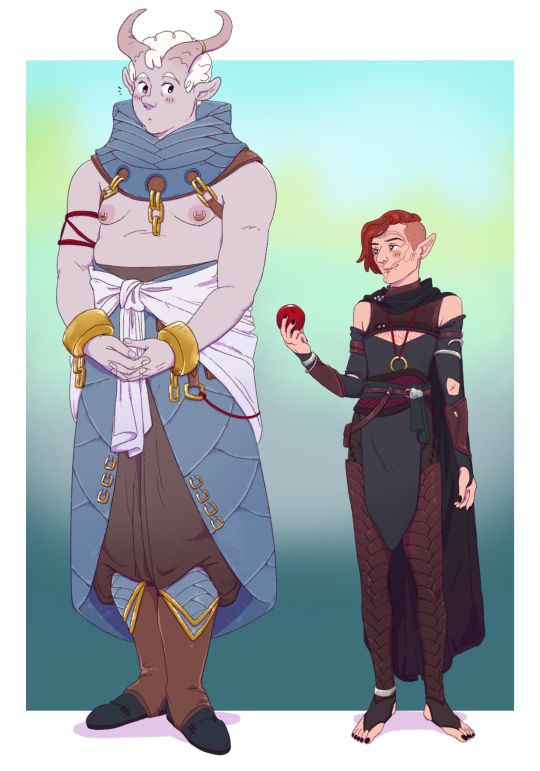
Dragon Age AU!!
Qunari saarebas Aziraphale and Dalish Rogue turned Crow (no pun intended) Crowley

#good omens#ineffable husbands#aziraphale#crowley#aziracrow#ineffable muffins#dragon age au#from a conversation with cassieoh and kaiart252#Crowley's vallaslin is based on June's but I made it more squiggly to incorporate his regular snake tattoo#and Aziraphale can do real magic (obviously) but likes to do corny street magic#(but can cuz the Qun has no sense of humor)#I had a ton of fun drawing these#might do more with them later
608 notes
·
View notes
Text


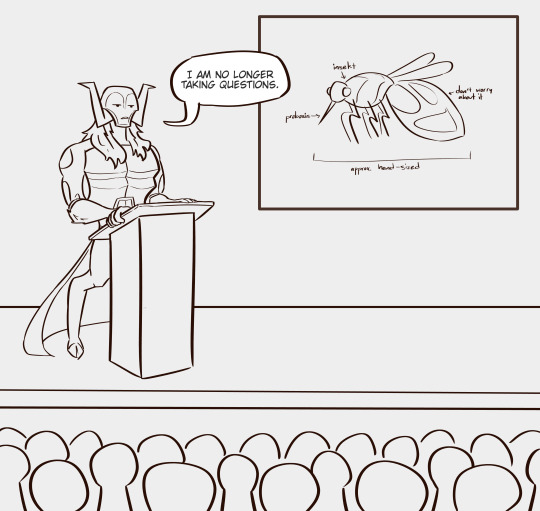
the idea of Draxum in academic settings is vastly entertaining to me
#rottmnt#rottmnt au#minor interference au#rottmnt baron draxum#rise draxum#rottmnt fanart#rottmnt fanfiction#tw insects#rise of the tmnt#rise of the teenage mutant ninja turtles#my art#draxum: i am going to make mosquitos Bigger and Worse#the entire yokai scientific community: okay but why would you want to do that#draxum: uh. just because?#(it's really for war crimes but obviously you can't just say that and still expect funding)#the real question: is that a power point slide? or did draxum just make a 4 foot tall poster of an oozesquito and misspell half the words
421 notes
·
View notes
Text
genuinely killing undyne in a neutral run and then walking through hotland later and seeing alphys' posts go "just realized i didn't watch undyne fight the human... well i know she's unbeatable i'll ask her about it later v . v" completely unaware of what's happened is one of the most unpleasant and harrowing experiences in undertale and i am not kidding even a little bit
#undertale#she doesn't fucking know.#that's part of why undyne's no mercy death is in a way less heartbreaking than her neutral death#partly because in neutral she didn't expect this. she had no clue you would be powerful enough- experienced enough- to defeat her#and she dies terrified of what you'll do to her loved ones#while in no mercy she gave it all she had and she dies knowing alphys has a plan to evacuate everyone if she loses#AND alphys at least knows. like. watching your best friend and the one you love die horribly in real time#while you're powerless to help obviously isn't fun.#but is it worse than having no idea she died until after you've unknowingly befriended her murderer#and helped them in every part of their quest?#is it worse than only finding out what's happened after they've gone and you're truly stuck there with her gone and them untouchable?#despite everything. undertale still makes me insane.
333 notes
·
View notes
Text
as an enormous fan. one of the worst things about taylor swift is how deeply cowardly she is when it comes to Avoiding Upset and how this + the vacuum of her life makes every interview/public appearance just. devoid of any real meaning. just absolute crafted nothingness.
#as she gets more calculated in her movements and her appearances and her Life her songs get worse#can i say that#like sOMETHING has to be genuine and it's certainly not midnights#everytime she speaks it's like me when im self absorbedly peach posting at 2am bc im anxious about something that isnt real#this is not entirely her fault obviously like she's basically been heavily pressurized into a diamond but at every step she has played into#is she capable of having thoughts that aren't self referrential and self policing#like i love her#i really deeply do#but i cannot imagine an inner life more isolating and out of whack than hers
190 notes
·
View notes
Text
i was thinking about how i wished leverage had a birthday episode for some of the characters cause that would be sweet, but then i realised something and basically…. okay here’s my thoughts in quotes form, just for fun
hardison: so when’s your birthday? i could plan something for us and the team to do and-
parker: i dont know
hardison: you don’t know… your own birthday?
parker: no, how would i know? pshh, cmon, you’re telling me you remember EXACTLY when you were born? watch this - hey, eliot, do you know your exact birth date?
eliot, innocently passing by, who was canonically anonymously dropped off at a hospital as an infant: no, how would i know?
parker: that’s what i said!
hardison: excuse me?? what is going on right now
sophie, walking into the apartment: whats wrong?
hardison: parker and eliot- well, okay, when’s your birthday? i just have to prove something.
sophie: …….july 12th
hardison: why did you pause? wait, is that your birthday or sophie devereaux’s birthday?
sophie: ………… (guilty silence)
parker: see, no one knows their real birthday! haha you’re so weird sometimes, hardison
hardison:
hardison: what the fuck guys
#leverageposting#wren speaks#leverage#parker leverage#alec hardison#nate knows his birthday i guess so i didn’t include him. if he was watching the whole time he would probably say ‘idk’ to mess w hardison#they’re having this convo in nate’s apartment but it’s like 3am & he’s asleep & they’ve all broken in to hang out#parker doesn’t know either bc of her ridiculously neglectful foster parents or bc she’s parker & her priorities are simply different to most#people. her birthday is irrelevant to thievery. and sadly probably not related to fun happy memories anyway.#sophie obviously is a good enough grifter to answer confidently but she feels a little bad abt lying to her family by now#meanwhile hardison had a normal foster nana who would have known his bday. most kids aren’t safe-surrendered like eliot so assumably#hardison would have a known bday. and he likes birthdays!#and he wants to throw parker a little party even if it’s a very unconventional parker bday that involves rappelling & jumping off buildings#but he is once again thwarted by the leverage team members having the strangest possible lives#he IS gonna give them each birthday parties tho. even if he has to make up some dates & stuff#sophie’s can be the fake date she gives if that’s what she rlly wants. nate’s real birthday is on file somewhere even if he’s being annoying#rn so hardison just has to do some basic hacking. eliot would have an approximate bday such as the day he was surrendered that his parents#would have celebrated throughout childhood. and parker’s would be april 1st bc that’s alice whites bday (and YOURE ALICE!!!)#as in it’s canonically in the online info abt alice white shown in the juror no.6 job & obvs that’s april fools so it’s funny :)#and hardison has a NORMAL bday unlike SOME ppl and yes he DOES expect presents you heathens!!
104 notes
·
View notes
Text
the pathologic Kin is largely fictionalized with a created language that takes from multiple sources to be its own, a cosmogony & spirituality that does not correlate to the faiths (mostly Tengrist & Buddhist) practiced by the peoples it takes inspirations from, has customs, mores and roles invented for the purposes of the game, and even just a style of dress that does not resemble any of these peoples', but it is fascinating looking into specifically to me the sigils and see where they come from... watch this:
P2 Layers glyphs take from the mongolian script:

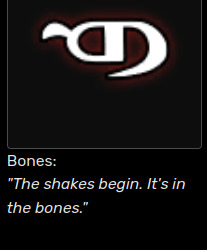

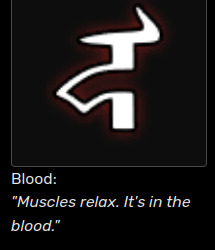

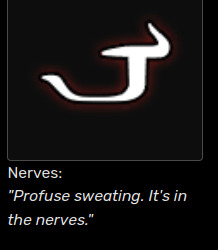

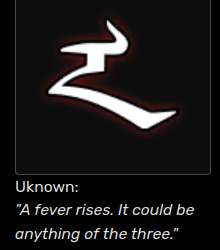
while the in-game words for Blood, Bones and Nerves are mongolian directly, it is interesting to note that their glyphs do not have a phonetic affiliation to the words (ex. the "Yas" layer of Bones having for glyph the equivalent of the letter F, the "Medrel" layer of Nerves having a glyph the equivalent of the letter È,...)
the leatherworks on the Kayura models', with their uses of angles and extending lines, remind me of the Phags Pa Script (used for Tibetan, Mongolian, Chineses, Uyghur language, and others)


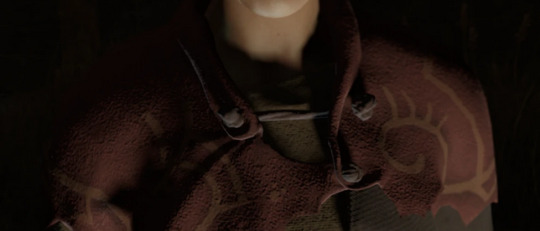
some of the sigils also look either in part or fully inspired by Phags Pa script letters...






some look closer to the mongolian or vagindra (buryat) script




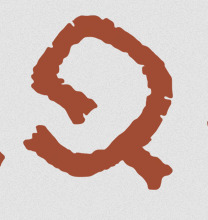
looking at the Herb Brides & their concept art, we can see bodypainting that looks like vertical buryat or mongolian script (oh hi (crossed out: Mark) Phags Pa script):
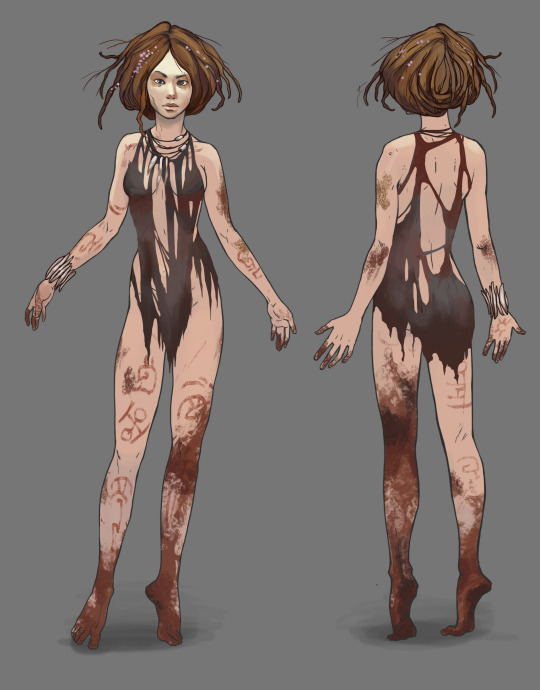
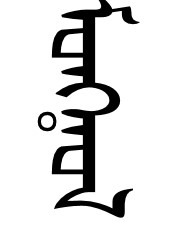
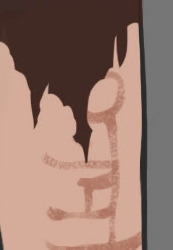


shaped and reshaped...
#not sure how much. what's the word. bond? involvement? not experience. closeness? anyone in the team has with any of these cultures#but i recall learning lead writer is indigenous in some way & heavily self-inserts as artemy [like. That's His Face used for#the p1 burakh portrait] so i imagine There Is some knowledge; if not first-hand at least in some other way#& i'm not in the team so i don't know how much Whatever is put into Anything#[ + i've ranted about the treatment of the brides Enough. enough i have]#so i don't have any ground to stand on wrt how i would feel about how these cultures are handled to make the Kin somewhat-hodgepodge.#there is recognizing it is Obviously inspired by real-life cultures [with the words;the alphabet;i look at Kayura i know what i see]#& recognizing it Also is. obviously and greatly imagined. not that weird for you know. a story.#like there is No Turkic/Altaic/Mongolic culture that has a caste of all-women spiritual dancers who place a great importance on nudity#as a reflection of the perfect world and do nothing but dance to bring about the harvest. ykwim...#like neither the Mongols nor the Buryats nor the Tibetans dress the way the Kin does. that's cos the Kin is invented. but they're invented.#.. on wide fundations. ykwim......#Tengrism has a Sky Deity (Tengri) with an earth-goddess *daughter* whereas the kin worship an Earth-Goddess mother of everything#+ a huge bull. Buddhism has its own complete cosmogony & beliefs which from the little I know Vastly Differ from anything the Kin believes#like. yeah. story. but also. [holds myself back from renting about the Brides again] shhh...#neigh (blabbers)#pathologic#pathologic 2
282 notes
·
View notes